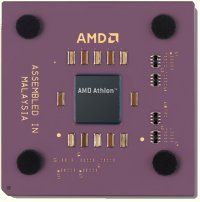Computex: AMD Releases 760MP Chipset For Dual AthlonMP
AthlonmP

We have seen pictures of Athlon with Palomino core in form of mobile Athlon4 processors before. AthlonMP is using the same core as Athlon4, but it doesn't put the PowerNow! power saving features to any use. The core voltage of our AthlonMP 1200 test samples was a surprisingly high 1.75 V. We know the new features of the Palomino core from our previous Athlon4 Mobile article, but I'll sum them up once more:
- New design to reduce power consumption over Thunderbird core by 20%
- Implementation of the full Intel SSE instruction set. The SSE processor flag is set so that software can recognize AthlonMP as a SSE-capable processor. AMD calls its SSE-implementation '3Dnow! Professional'.
- Hardware auto data pre-fetching unit
- L1 Data TLB (Translation Look-Aside Buffer) was increased from 32 to 40 entries, the architecture of the data and instruction L1 and L2 TLBs was made exclusive and TLB-entries can be written speculatively.
- Implementation of a thermal diode to monitor processor temperature
It is a bit disappointing to see that AMD is only releasing AthlonMPs at 1 and 1.2 GHz, but obviously, the validation had to be a lot tougher than for a single processor Athlon processors, and the relatively low clock speeds seem to be required for reliable SMP operation.
We learned from AMD's presentation, that the above features should improve Palomino's performance over the previous Thunderbird Athlons. The benchmark results further down will confirm this. In terms of compatibility, I have made the experience that many current SocketA motherboards will run AthlonMP, but the majority of boards didn't recognize the Palomino core, which resulted in unstable operation. Only Asus' A7V133 was able to report 'Athlon H-series Processor' and ran AthlonMP reliably. Unfortunately, I didn't benchmark AthlonMP on this board, since it only supports PC133 and therefore isn't able to show Palomino's full potential. The motherboards that didn't recognize Palomino did also somehow 'cover' the SSE-flag, so that software was unable to recognize Palomino's SSE-capability. Only the Asus A7V133 and of course Tyan's K7 Thunder enabled the correct reporting of a set 'SSE' feature flag.
Overall, I expect that many current SocketA motherboards will support Palomino once they are equipped with the proper BIOS. Until then, I would suggest to buy a faster Thunderbird Athlon instead, since AthlonMP is more expensive than the 'normal' Athlon with Thunderbird core. AMD supplied us with the following pricing information:
$265 for AthlonMP 1.2 GHz (OEM price for 1000 unit quantities)
$215 for AthlonMP 1.0 GHz (OEM price for 1000 unit quantities)
Stay on the Cutting Edge
Join the experts who read Tom's Hardware for the inside track on enthusiast PC tech news — and have for over 25 years. We'll send breaking news and in-depth reviews of CPUs, GPUs, AI, maker hardware and more straight to your inbox.
Current page: AthlonmP
Prev Page The One And Only AMD760MP Motherboard Next Page AMD SMP Technology - SmartMPMost Popular

